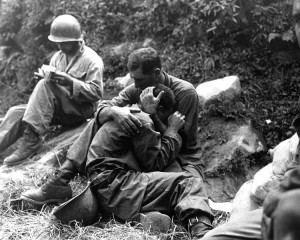Korean War and Self Inflicted Injuries
Helen Meyer wrote about the experiences of the G.I. patients whom she cared for in letters back to her family in Oberlin, Ohio. She truly cared for the soldiers and loved the work she was doing with them. She wrote often that despite the “ruggedness” of Korea the excitement and joy on the soldiers faces made it all worth it. The Korean War was predominately known as a war with low morale both with the American public domestically and the troops abroad. In two particular letters, Helen explains the lack of morale and the intense desire to return home by describing the increase in self inflicted injuries among patients in the Johnson Air Force Hospital in Japan. Two months after landing in Japan, Helen wrote a letter to her parents and sister on February 18, 1951 describing her feelings and observations on the subject:
“The future is so depressing that I don’t allow myself to think about it very much…We get many of the patients whose wounds are self-inflicted. This whole self inflicted wound business is an interesting thing. It is often hard to prove that a wound has been self- inflicted but the doctors through experience have come to know them. Because there are so much self-inflicted wounds it just shows the lack of spirit there is in this war. So many of the boys will do anything to get out of Korea and they will even tear open their own wounds at night in the hospitals here in Japan and hold their thermometers under matches to keep from going back to duty…. In a way I suppose you can’t blame them. If I was in combat I would probable do the same thing. No one wants to die and especially when you are about to die for nothing, as seems to be true in Korea.”
Unfortunately the military self inflicted wounds did not end in Korea, in an article entitled ‘Anything Not to Go Back” written by Tony Dokoupil and published in Newsweek Magazine on June 7, 2008. More than fifty years after the end of the Korean War, Dokoupil reported the same situation among soldiers who are scheduled to serve in the War in Iraq. The Newsweek article described two men who self inflicted harm to prevent a return to combat, one who swallowed a pen at a Grayhound Bus Station and another who hired a hit man to shoot him in the knee.

According to Army Psychologist Col. Kathy Platoni “there are some soldiers who will do almost anything not to go back.” Dokoupil writes that these cases are uncommon and difficult to identify although there shows a rising trend in military self harm in the recent past.
These cases of self inflicted harm are the extreme results of a low military morale in a long and tiring war. According to Helen, the “little police action” that is the Korean War was brutally hard on the G.I.’s stationed in Korea and though few of them went to such extremes, nearly all of the soldiers she encountered just wanted to go home.

Leave a Reply